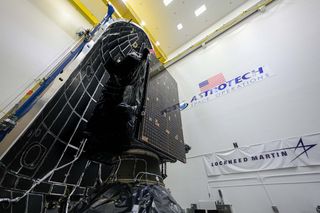You can watch SpaceX launch a new GPS satellite for the US Space Force today. Here's how.
Liftoff is at 12:09 p.m. EDT (1609 GMT).
Update for 12:36 pm ET: SpaceX has successfully launched the GPS III SV05 satellite for the U.S. Space Force. See launch video and photos in our wrap here. The mission's Falcon 9 rocket upper stage is in a coast phase, with satellite deployment set for about 1:38 p.m. EDT (1739 GMT).
CAPE CANAVERAL, Fla. — SpaceX is set to launch an upgraded Global Positioning System (GPS) satellite into orbit for the U.S. Space Force today (June 17), and you can watch the action online.
The flight — the 19th launch this year for SpaceX and its workhorse Falcon 9 rocket — is scheduled to blast off from Space Launch Complex 40 at Cape Canaveral Space Force Station here during a 15-minute window that opens at 12:09 p.m. EST (1609 GMT). Perched atop the rocket is the GPS III-SV05 satellite, which was built by Lockheed Martin.
You can watch the launch live here and on the Space.com homepage, courtesy of SpaceX, beginning about 15 minutes before liftoff. You'll also be able to watch the launch directly from SpaceX here.
Related: The U.S. GPS satellite network explained
If all goes as planned today, this will be the fifth launch of an upgraded next-generation GPS III satellite to date.
Built by Lockheed Martin in Colorado, these upgraded GPS satellites are some of the most sophisticated spacecraft ever built. They’re equipped with anti-jamming capabilities that are more robust than previous iterations and more powerful signals for increased accuracy, Lockheed Martin representatives have said.
Get the Space.com Newsletter
Breaking space news, the latest updates on rocket launches, skywatching events and more!
Today’s launch features the fifth in a series of 10 upgraded GPS III satellites for the military that will join the current constellation of satellites already in orbit. They will help provide positioning, navigation and timing services for more than four billion users worldwide. GPS III-SV05 will replace an aging predecessor that was launched two decades ago.
Last year, Space Force officials announced that the U.S. military had granted SpaceX permission to launch national security payloads on previously flown rockets.
The news followed on the heels of another recent decision to allow SpaceX to recover the first stages of Falcon 9 boosters used on national security missions, something that was previously not allowed.
Today's mission will be the first to fly on a veteran Falcon 9. After ferrying the GPS satellite into space, the rocket will subsequently land back on Earth, on a floating platform at sea.
The star of today’s mission will be a previously flown Falcon 9 first stage, known as B1062 to SpaceX. It is embarking on its second mission, after lifting another GPS satellite last year.
Related: China launches final Beidou satellite to complete GPS-like system

SpaceX's drone ship "Just Read the Instructions" is positioned in the Atlantic Ocean, awaiting its planned recovery attempt. Approximately 9 minutes after liftoff, the two-stage rocket's first stage is expected to touch down on the deck of the massive ship. SpaceX is also debuting a new recovery vessel on this mission, named Hos Briarwood, to recover the clamshell-like payload fairings, which will protect the GPS III SV05 satellite during ascent, after they fall back to Earth under parachutes.
It's summer storm season here on the space coast; however, weather officials with the Space Force's 45th Space Delta have predicted a 70% chance of favorable conditions at liftoff. According to weather officials, the main concerns are electric field rule, possible upper level wind shear and cumulus clouds.
If SpaceX is unable to launch the GPS III SV05 satellite today, it will have a backup opportunity on Friday at 12:05 p.m. EDT (1605 GMT).
Correction: A previous version of this story stated the GPS III SV05 launch will be the 18th launch in 2021 for SpaceX. It is the 19th launch.
Follow Amy Thompson on Twitter @astrogingersnap. Follow us on Twitter @Spacedotcom or Facebook.
Join our Space Forums to keep talking space on the latest missions, night sky and more! And if you have a news tip, correction or comment, let us know at: community@space.com.

Amy Thompson is a Florida-based space and science journalist, who joined Space.com as a contributing writer in 2015. She's passionate about all things space and is a huge science and science-fiction geek. Star Wars is her favorite fandom, with that sassy little droid, R2D2 being her favorite. She studied science at the University of Florida, earning a degree in microbiology. Her work has also been published in Newsweek, VICE, Smithsonian, and many more. Now she chases rockets, writing about launches, commercial space, space station science, and everything in between.
